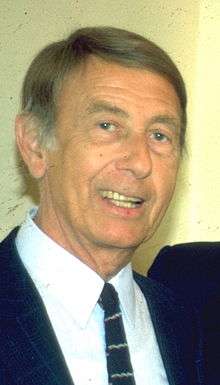Franck Pourcel
Franck Pourcel (14 August 1913 – 12 November 2000) was a French composer, arranger and conductor of popular music and classical music.

Biography
Born in Marseille on 11 August 1913, Pourcel started learning the violin at the age of six. Later, Pourcel studied violin at the Conservatoire in Marseille, and also drums because he loved jazz, and spent a year in Paris at the Conservatoire.
By 1931, he was working as a violinist in several theaters in Marseille, marrying Odette eight years later. He then became the musical director for Lucienne Boyer, with whom he went on a world tour.
He immigrated to the United States in 1952 but returned to France the following year to record "Blue Tango" and the follow-up "Limelight". In 1954, Pourcel recorded his first album on the Pathé-Marconi record label, with whom he would record a total of nine albums in a three-year period. In 1956, he recorded his version of "Only You", which sold over three million copies by 1959, and was awarded a gold disc.[1] It peaked at #9 on the United States Billboard pop chart during a 16 weeks chart run.
Between 1956 and 1972, he was the conductor for France at the Eurovision Song Contest with the exceptions of 1957 and 1968. Four of the songs that he conducted won first place for France. As a result, France became the most successful country in the contest's early years, until Luxembourg matched its four wins in 1973.
By 1958, Pourcel started recording classical music. His series of Pages Célèbres led him to conduct the London Symphony Orchestra, The Society of Concerts for the Conservatoire, The BBC Orchestra at the Royal Festival Hall, and the Lamoureux Orchestra at the Salle Pleyel in Paris. In 1961, he co-composed with Paul Mauriat the hit "Chariot", which was recorded by Petula Clark and followed up by Peggy March as "I Will Follow Him". The song became the main theme for the film, Sister Act.
In 1975, at the request of Air France, Pourcel composed an anthem for their new supersonic plane, Concorde.[2]
Pourcel recorded 250 albums, over 3000 songs, and he conducted famous orchestras such as London Symphonic Orchestra, BBC Orchestra and Orchestre des concerts Lamoureux. He created the series Amour Danse et violons (54 albums) and the classical series Pages Célébres. His first recordings from 1956 to 1962 were released under the series Originals.
Pourcel recorded until 1995 with EMI. He died on 12 November 2000 in Neuilly-sur-Seine, at the age of 87, from Parkinson's disease. His daughter Françoise Pourcel, is taking care of his musical legacy.
Awards
He was rewarded with the following distinctions:
- 1956: The Grand prix du disque Français
- 1957: The Grand prix du disque in Brazil
- 1963: The Golden disc in Venezuela Discomoda
- 1965: Amsterdam: The Edison Prize for his orchestrations of pop music
- 1966: Gold record for his sales in France
- 1968: Golden disc in Colombia for Disco Mundo
- 1969: Grand Prix du disque of the Charles Cros Academy in Paris
- 1969: Gold record in Japan for the album Continental Tango
- 1970: Gold record in Japan for album Adoro, featuring "Adoro"
- 1972: Tokyo Music Festival; Arranger award
- 1973: Guacaipuro de Oro in Venezuela
- 1973: Gold record in Japan for the album For Your Lovely Baby
References
- Murrells, Joseph (1978). The Book of Golden Discs (2nd ed.). London: Barrie and Jenkins Ltd. p. 117. ISBN 0-214-20512-6.
- English. franckpourcel.com (1913-08-14). Retrieved on 2012-04-23.
External links
| Media offices | ||
|---|---|---|
| Preceded by |
Eurovision Song Contest conductor 1959 |
Succeeded by |
| Preceded by |
Eurovision Song Contest conductor 1961 |
Succeeded by |